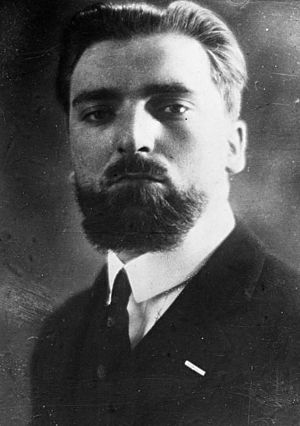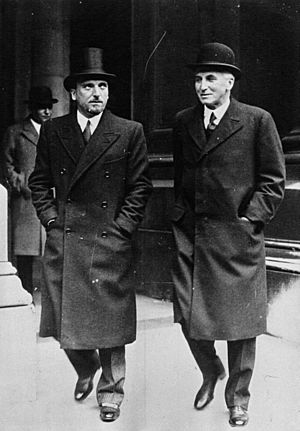Dino Grandi facts for kids
Quick facts for kids
Dino Grandi
|
|
|---|---|
 |
|
| President of Chamber of Fasces and Corporations | |
| In office 30 November 1939 – 2 August 1943 |
|
| Preceded by | Costanzo Ciano |
| Succeeded by | Vittorio Emanuele Orlando |
| Minister of Grace and Justice | |
| In office 12 July 1939 – 5 February 1943 |
|
| Prime Minister | Benito Mussolini |
| Preceded by | Arrigo Solmi |
| Succeeded by | Alfredo De Marsico |
| Ambassador of Italy to the United Kingdom | |
| In office 3 August 1932 – 13 October 1939 |
|
| Prime Minister | Benito Mussolini |
| Preceded by | Antonio Chiaramonte Bordonaro |
| Succeeded by | Giuseppe Bastianini |
| Minister of Foreign Affairs | |
| In office 12 September 1929 – 20 July 1932 |
|
| Prime Minister | Benito Mussolini |
| Preceded by | Benito Mussolini |
| Succeeded by | Benito Mussolini |
| Personal details | |
| Born | 4 June 1895 Mordano, Italy |
| Died | 21 May 1988 (aged 92) Bologna, Italy |
| Political party | National Fascist Party |
| Alma mater | University of Bologna |
| Profession | Lawyer politician |
Dino Grandi (born June 4, 1895 – died May 21, 1988) was an important Italian politician. He was a key figure in the Fascist government. Grandi served as a minister, including Minister of Justice and Minister of Foreign Affairs. He also became the president of the Italian parliament. He was given the title of Count of Mordano.
Contents
Early Life and Political Start
Dino Grandi was born in Mordano, a town in Italy, in 1895. After fighting in World War I, he studied law and economics. He graduated from the University of Bologna in 1919. Grandi then began his career as a lawyer in Imola.
He was interested in politics from a young age. Grandi was drawn to the ideas of Benito Mussolini. He strongly believed Italy should join World War I. At 25, he joined the Blackshirts, a Fascist group. In May 1921, Grandi was elected to the Chamber of Deputies. This was a part of the Italian parliament.
A Leading Fascist Statesman

After the March on Rome in October 1922, the Fascists took control of Italy. Grandi became an important part of the new government. He served as an undersecretary, then as Italian Minister of Foreign Affairs in 1929. Later, from 1932 to 1939, he was Italy's ambassador to the United Kingdom.
Grandi was close to the more extreme Fascist groups. He often had Blackshirt members around him. He used his position to express his opinions. He even disagreed with Mussolini at times. For example, he tried to make a deal between Italy and Britain. He hoped this would stop Italy from joining World War II.
Because of this, Mussolini removed him from his ambassador role in 1939. Grandi was then appointed Minister of Justice. Grandi was a skilled diplomat. He built many connections, similar to Mussolini's son-in-law, Galeazzo Ciano. He used these connections to his advantage. In 1937, he convinced King Victor Emmanuel III to give him a special title.
Grandi did not support the Italian racial laws of 1938. He also disagreed with Italy joining World War II. In February 1943, he was removed from his government position. This was because he was increasingly critical of the war.
Mussolini's Downfall and Grandi's Escape
As World War II continued, Italy faced many difficulties. The Allied invasion of Sicily in 1943 made things worse. On July 24, 1943, Grandi and other members of the Fascist Grand Council met. Mussolini spoke about the war, and Grandi strongly criticized him.
Grandi then proposed a motion, known as the Ordine del giorno Grandi. This motion asked King Victor Emmanuel III to take back his full power. The vote happened on July 25, and it passed. This vote effectively removed Mussolini from his leadership role. The King had Mussolini arrested on the same day.
After Mussolini's fall, a new Fascist government was set up in Northern Italy. This was called the Italian Social Republic. This new government accused Grandi of disloyalty. He was found guilty in his absence at the Verona trial in January 1944.
However, Grandi had already left Italy. He fled to Francisco Franco's Spain in August 1943. He lived in Spain, then in Portugal, Argentina, and Brazil. Grandi finally returned to Italy in the 1960s. He passed away in Bologna in 1988.
See also
In Spanish: Dino Grandi para niños
 | William L. Dawson |
 | W. E. B. Du Bois |
 | Harry Belafonte |

